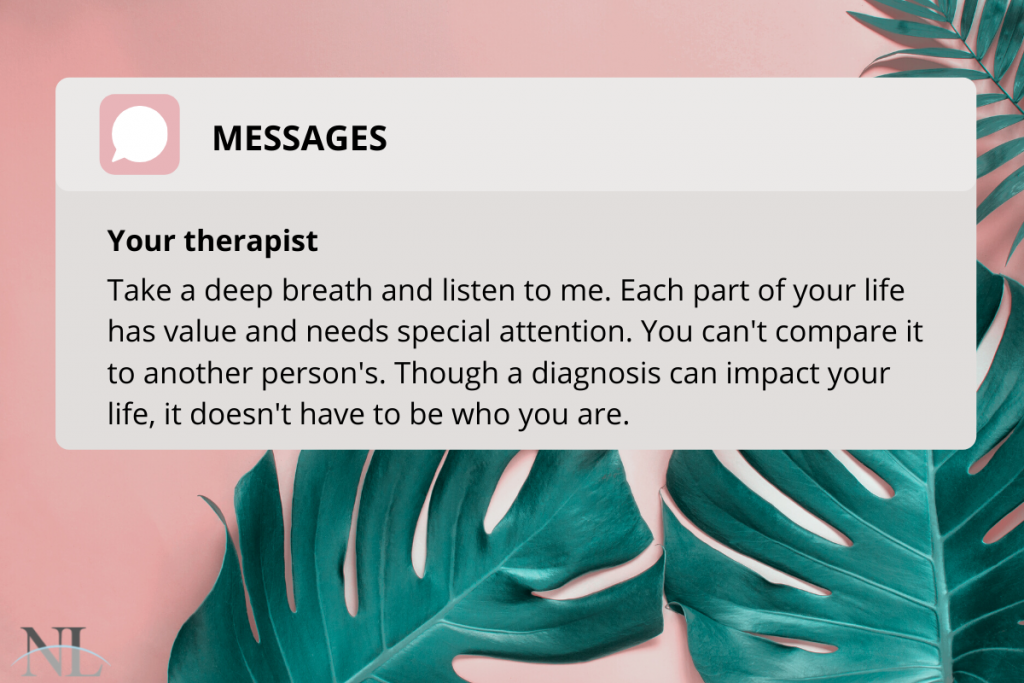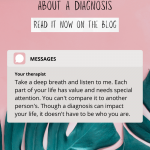Your Diagnosis: A Letter From A Counselor
As a counselor, I get a wide variety of people that need to talk through situational stress, relationship problems, grief and loss, patterns of behavior, trauma and all that comes with it. In honor of Mental Health Awareness Month, I wanted to take the opportunity to share three things to keep in mind if you or someone you love has received a mental health diagnosis.
What I want my clients to know about a Diagnosis

1. A diagnosis is a work in progress.
When people enter my office, they are dealing with all forms of anxiety, depression, obsessive tendencies, stress, agitation, and/or a behavior they wish to change. While many of these are often times situationally based, it takes time to understand if there is another mental illness issue going on. A symptom of anxiety and depression can have multiple root causes. Anxiety can be caused by trauma, ADHD, a result of substances, a reaction to stress, a chemical imbalance, or a on a pendulum swinging to and from depression- as seen in bipolar. It takes time to understand if there is an underlying mental health issue happening because it has likely been masked by other things, and it takes time to understand each layer of a person’s behavior. At the beginning, we may focus on the trauma or substance abuse issue because it’s the most glaring and life impacting aspect of a person’s mental health. Over time as we work through those parts, we may discover there has been underlying depression, ADHD, or bipolar that was present but went undetected because the other parts of our mental well-being were taking our attention.
2. Your diagnosis is not your identity.
I like to look at our well-being like a garden. There are so many different aspects and parts to a garden that make it healthy and vibrant. It is same with all the different parts of ourselves, but if not taken care of, a garden can easily get over run, dried out and will be able to produce anything of value. No two gardens are the same; gardens require varying treatment based on which plants they have, location and climate.
In our well-being garden, we can’t change the plants that are there, just how we treat them. These plants can represent our friendships, career, family, and physical health. Our mental health is another plant in our garden. Perhaps your mental health is the type of plant, that if you don’t properly tend, can overtake the other parts of your garden causing the other plants to decline. In its proper place, your mental health is a part of your garden that makes you unique. Some of us have easy plants in our garden, so it doesn’t take much work to keep a healthy balance. Others have the infamous kudzu plant in our garden that can grow up to a foot per day covering everything in its path. My point is this: a diagnosis just means you now have a direction on how to treat this plant in your garden, so you can create the look and space you desire.
3. Its normal to have a range of emotions after being diagnosed.
We live in a world where there is still stigma surrounding certain diagnoses, and mental health terms get thrown around carelessly to describe behavior. Although there is a growing trend towards normalizing therapy and the stigma around mental health is lessening, you may still have your own personal feelings about what a diagnosis might mean for you and your family. You may experience grief related to loss, isolation, anger, fear of judgement, feelings of overwhelm, maybe even denial. Regardless of the reaction and the diagnosis, give yourself permission to feel whatever comes up and you will find a way forward.
I encourage you to look at all the aspects of your well-being garden, each part of your life has value and needs special attention. You can’t compare your garden to another person’s, and learning to accept what you have is the first step towards creating something beautiful and fruitful. Though a diagnosis can impact your life, it doesn’t have to be who you are.
As always, our mission here at New Life is to provide you with the tools necessary to thrive and succeed in your life. Keep practicing this self-care stuff, keep tuning in, and reach out if you need help with any of it.
This article was written by Emilie LeLaCheur. Emilie is no longer with New Life Counseling.

